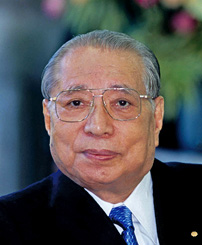|
Looking
for Hope

By
Daisaku
Ikeda
President, Soka Gakkai
International
TFF
associate
April 15, 2003
An essay by SGI President Ikeda which
summarized the key themes of the January 26, 2003
Peace Proposal, "A Global Ethic of Coexistence: Toward
a 'Life-Sized' Paradigm for Our Age."
Citizens everywhere today are demanding that their
leaders make choices to advance the cause of peace.
Having seen the end of the Cold War, they are deeply
concerned that our world seems poised on the edge of a
new and even more ominous "clash"-one based on cultural
and religious difference.
They are disturbed by the grotesque imbalance between
our powers of destruction and our failing ethical
capacity for empathy and self-restraint. They recoil at
the bizarre sight of million-dollar missiles flying over
the heads of people subsisting on one or two dollars per
day. They sense that such a world is dangerously
askew.
But I firmly believe that such a clash of
civilizations is not inevitable. It can and must be
avoided. I believe that people possess immense and
untapped resources-including the capacity to bring forth
a creative, dynamic harmony from the sometimes baffling
diversity of our world.
The key to this is a new ethic of coexistence, one
that encourages appreciation of our interconnection, the
awareness that what impacts any one member of the human
family impacts us all. This in turn requires that we
refocus on individual human beings, that we establish a
"life-sized" paradigm or approach.
When people are presented with the realities of other
people's lives, feelings of connection and empathy
naturally arise. This is why war and violence always
start with efforts to dehumanize the "enemy." This is why
the media in any country will portray "our" suffering in
detail, while minimizing or ignoring the misery inflicted
on the anonymous mass that is "them."
If we travel in imagination to enemy lands, follow in
our minds the lives of those on the other side of the TV
screen, we find people no different from ourselves. Like
us, they seek the ordinary joys of fellowship and love,
celebrate the vibrant growth of children, pray that their
parents may enjoy security and health.
This is the reality, the fabric of ordinary lives,
that war-that terrorism and all forms of
violence-destroys, leaving only gray misery in its wake.
For, in the end, we are talking of the violent deaths of
loved ones. Behind the computer game-like graphics are
real human beings, just like us-someone's son or
daughter, someone's best friend or lover. The buildings
may be rebuilt, but the wounds and scars of violence
never really heal.
Genuine leadership in the 21st century must be based
on a solid commitment to protecting the precious fabric
of daily life. The ordinary citizens of the world are
raising their voices to insist that all
decisions-including the political, military and
economic-be made with these human realities firmly in
view. The common cause of human happiness is the
strongest basis for human solidarity. In a world of
intimate interconnection, solidarity cannot be limited to
just one group or nation. It must embrace all people
everywhere.
This is not, I am firmly convinced, empty idealism. I
do not believe that the very real differences of culture
and worldview need separate us in some insurmountable
way.
Such a "life-sized" paradigm is at the same time
cosmic in its outlook. When we truly focus on individual
human beings, we can see each person as manifesting
unique aspects of a universe of human possibility-and
doing so in an invaluable and irreplaceable manner. The
same can be said of each culture or tradition. Each is a
brilliant "wave" dancing on the oceanic depths of our
common humanity.
Peace will not come from passive waiting. It must be
worked for with energy and focus. The greatest "weapon"
of those who would create peace is dialogue, the refusal
to abandon the capacity for language that makes us human.
Dialogue and communication-whatever the immediate
outcome-is in itself an act of faith in our humanity. It
is this faith that we must ceaselessly work to strengthen
and confirm. The struggle to understand and be understood
requires that each of us return to the deepest sources of
our humanity, beyond differences of history, culture or
creed.
For it is there-and in the quiet aspirations of daily
life-that we will find answers to the daunting challenges
that face us.
©
TFF & the author 2003

Tell a friend about this article
Send to:
From:
Message and your name
|